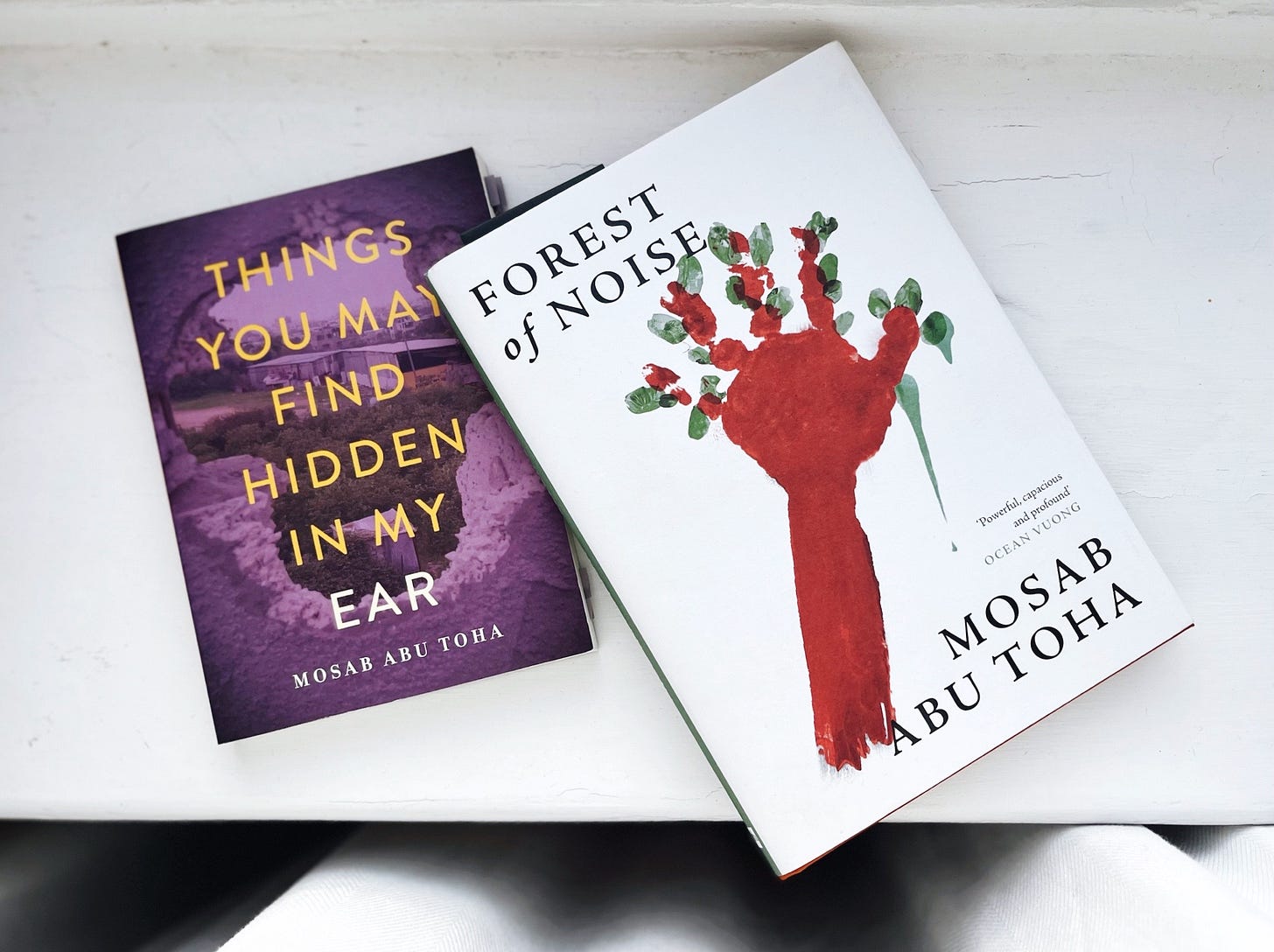My Son Throws a Blanket Over My Daughter by Mosab Abu Toha
Seven Days of Palestinian Poetry: 2 Poems for Day 2. #ReadPalestine Week
You might recall that back in August I shared a poem everyday for the month, which is what inspired this current endeavour for Read Palestine Week. One of the poets I featured was Mosab Abu Toha and his 2022 collection Things You May Find Hidden Behind My Ear, which is a collection I loved so much that I spent most of this year eagerly anticipating the publication of his second collection. Rarely do I go out of my way to make publication day purchases, however, when Forest of Noise was published in the UK earlier this month, I purchased it at the earliest opportunity and read it (almost) immediately.
Forest of Noise is a brilliant collection of poems but, more than that, it serves as an eye-witness testimony. What we, as readers, are being called upon to bear witness to- what Mosab Abu Toha and countless other Palestinians have experienced- should not have happened and most certainly shouldn’t still be happening. As such, I desperately wish this collection didn’t have to exist but I’m also glad that it does.
Today I’ve chosen to share two poems from the collection because it just made sense to me and I didn’t think you’d mind.
My Son Throws a Blanket over My Daughter Gaza, May 2021 At night, at home, we sit on the floor, close to each other far from the windows and the red lights of bombs. Our backs bang on the walls whenever the house shakes. We stare at each other's faces, scared yet happy that, so far, our lives have been spared. The walls wake up from their fitful sleep, no arms to wipe at their bleary eyes. Flies gather around the only lit ceiling lamp for warmth in the bitter night, cold except when missiles hit and burn up houses and roads and trees. The neighbourhood next to us, where Yazzan learned to ride his bike, scorched. Every time we hear a bomb falling from an F-16 or an F-35, our lives panic. Our lives freeze somewhere in between, confused where to head next: a graveyard, a hospital, a nightmare. I keep my shivering hand on my wristwatch, ready to remove the battery if needed. My four-year-old daughter, Yaffa, wearing a pink dress given to her by a friend, hears a bomb explode. She gasps, covers her mouth with her dress's ruffles. Yazzan, her five-and-a-half year old brother, grabs a blanket warmed by his sleepy body. He lays the blanket on his sister. You can hide now, he assures her.
Grandparents In the refugee camp, Grandmother Khadra puffs away at her cigarette. Smoke mingles with the coffee steam rising from Grandfather Hasan's chipped but favourite cup. Short Khadra muses on her wedding party in Yaffa in 1946: They placed two cinder blocks under my feet on the stage. My mother brought dinner for us at night: chicken soup, rice and some bread she baked in her clay oven. Khadra turns to Hasan: You lit the candle before the wind blew it out. Through our bedroom's wooden casement window, a breeze froze my makeup, but your kisses melted me down. Together in the refugee camp and thirty-five years after their wedding, Khadra fingers her beads while Hasan observes her from his wheelchair. Dust covers their photo frame, which Hasan hung on a wall when he could stand. Hasan's and Khadra's stories fill their small house. At night, it starts to drizzle, and beads of rain seep through some holes in their corrugated asbestos roof. Rain wakes my Khadra and her children. My father is still nine. Rain waters the stories that sleep on the old, tiled floor.
It was hard to choose a single poem from this collection. I initially settled on My Son Throws a Blanket Over My Daughter, however, Grandmother is the poem that follows it and I think the experience of reading one is enhanced by reading the other alongside it. There’s something about the way the two poems illustrate the passage of time, the multiple generations affected, the childhoods turned to adulthoods overshadowed and marred by one catastrophe after another, yet in no way devoid of love and tenderness.
To me, it’s not the depiction of tragedy that makes both poems so affecting. I found myself so moved Abu Toha’s portrayal of both his son, Yazzan in the first poem, and his grandfather, Hasan in the second as providers of comfort and warmth- a beautiful disposition that has been passed on through the generations even in the face of perpetual hardship.
It’s impossible to read these poems and not think of the numerous, well-documented examples of Palestinian men tending to those around them: men who feed, nurse, console, shroud, bury, rescue and defend- inevitably risking their lives in the process. These men are often an afterthought in the reported statistics but they matter just as much as the women and children we are so often called to focus our attention on.
If you’re looking to read more on Palestine, a number of free ebooks have been made available by various publishers, all of which are available via Publishers for Palestine.
Lastly, just in case you missed it, here’s yesterday’s poem:
Until tomorrow,
Tasnim








In his poem, My Son Throws a Blanket Over My Daughter, to what does Mosab Abu Toha refer when he writes, "I keep my shivering hand on my wristwatch, ready to remove the battery if needed"?